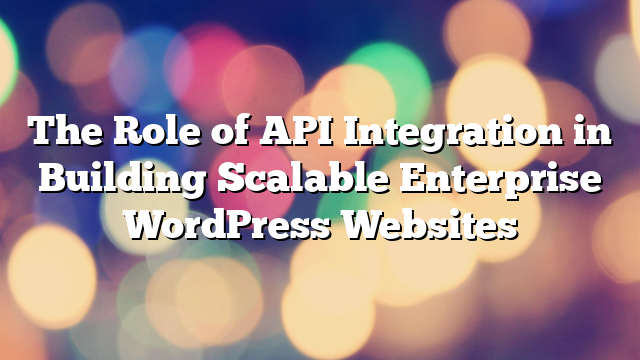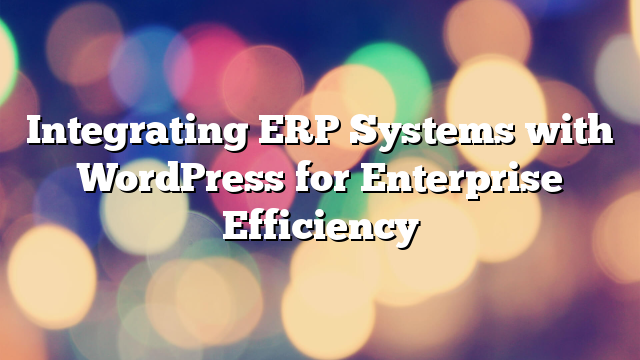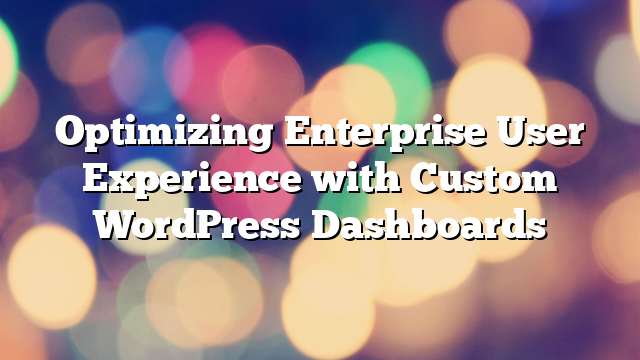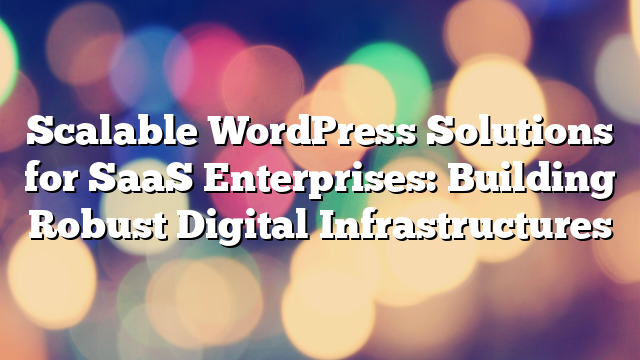The Role of API Integration in Building Scalable Enterprise WordPress Websites
06.01.2025

For enterprises that rely on complex systems and large-scale web applications, scalability is a top priority. API (Application Programming Interface) integration is crucial for creating flexible and efficient WordPress websites that can grow with the business needs. By enabling communication between various software systems, APIs play a vital role in enhancing the performance, functionality, and scalability of enterprise-level websites. In this article, we’ll explore the importance of API integration for scalable WordPress solutions and how it supports the success of large-scale websites.
What is API Integration in WordPress?
API integration refers to the process of connecting external applications or services to your WordPress website through an API. WordPress itself provides a REST API that allows developers to interact with the website’s data in a more flexible and programmatic way. Through this integration, external systems like CRMs, ERPs, e-commerce platforms, payment gateways, and other enterprise tools can communicate directly with your WordPress site, exchanging data and triggering actions in real time.
APIs are particularly beneficial for enterprise websites because they enable the seamless connection of multiple tools and services, without the need for manual data entry or additional third-party software. This opens up new possibilities for enhancing website functionality, improving user experience, and scaling operations effectively.
1. Enhancing Website Performance with APIs
One of the key benefits of using APIs in WordPress is the significant performance improvement they offer. When building a website for an enterprise, you need to ensure that it can handle large amounts of data, multiple integrations, and high traffic without slowing down. By using APIs, data can be fetched or updated dynamically in the background, allowing for a more responsive and faster website experience.
For example, APIs can retrieve data from external databases or services and display it on the website in real time, reducing the need for storing large datasets locally. This can help prevent your WordPress site from becoming slow and cumbersome as your website grows and processes more requests. With optimized API calls, the site can maintain high performance and responsiveness even under heavy load.
2. Seamless Integration with Third-Party Tools and Services
Enterprises often rely on a variety of third-party software solutions to manage their operations, from customer relationship management (CRM) systems to marketing automation platforms and payment gateways. API integration enables seamless communication between WordPress and these external tools. Rather than manually transferring data or using outdated methods, APIs allow data to flow automatically between systems, improving efficiency and reducing the risk of errors.
For instance, WordPress can be integrated with CRM systems like Salesforce or HubSpot to automatically sync customer data, allowing for personalized user experiences and targeted marketing campaigns. Similarly, integrating with payment gateways like PayPal, Stripe, or Square ensures that transactions are processed smoothly and securely without the need for manual intervention.
3. Scaling Content Delivery and Multichannel Strategies
Scalability is a critical factor for large enterprises that need to serve content across multiple platforms, such as websites, mobile apps, social media, and IoT devices. API integration allows businesses to scale content delivery and implement a multichannel strategy without duplicating content or managing multiple platforms individually.
For example, WordPress can act as a centralized content hub, and APIs can distribute the content to various digital touchpoints like mobile apps or third-party websites. This helps maintain consistency in branding, messaging, and user experience across all channels while simplifying content management.
With Headless WordPress, where the back-end is decoupled from the front-end, API integration becomes even more critical. Content is stored and managed in WordPress, but through APIs, it can be sent to any front-end application, allowing businesses to build customized, performance-optimized user interfaces that scale across different devices.
4. Automating Business Processes with APIs
Automation is one of the key advantages of integrating APIs into WordPress websites. By connecting your WordPress site with business tools, you can automate a wide range of processes, from content publishing to order processing and customer notifications. APIs can help streamline workflows by connecting systems, reducing the need for manual data entry and preventing errors.
For instance, an enterprise WordPress website integrated with an e-commerce platform can automatically update inventory levels, process orders, and send customer receipts with minimal manual intervention. Similarly, an API connection between WordPress and an email marketing platform can automate the process of sending targeted campaigns based on customer behavior and purchase history, making marketing efforts more efficient.
5. Improving Data Analytics and Reporting
Enterprises need access to accurate data in real time to make informed business decisions. APIs play a crucial role in connecting WordPress websites with analytics platforms, allowing businesses to track user behavior, conversion rates, traffic sources, and much more. This integration allows for deeper insights into website performance, customer engagement, and marketing ROI.
For example, integrating Google Analytics or other reporting tools with WordPress via API can provide businesses with detailed reports that can help optimize user experience, identify areas for improvement, and adjust marketing strategies accordingly. Additionally, APIs allow data to be presented in real-time dashboards, making it easy for teams to access up-to-date performance metrics.
6. Future-Proofing Your Website with API Integration
As businesses continue to adopt new technologies and expand their operations, it’s essential to future-proof their digital infrastructure. APIs allow WordPress websites to integrate with emerging technologies and adapt to new industry trends, such as artificial intelligence (AI), machine learning (ML), and the Internet of Things (IoT).
By leveraging APIs, enterprises can seamlessly connect their WordPress websites to these next-generation technologies, ensuring that they stay ahead of the competition and meet changing customer expectations. Whether it’s using AI-powered chatbots for customer service or integrating IoT devices for real-time data collection, API integration makes it easy for businesses to adapt and innovate without overhauling their entire website structure.
7. Securing Your Website with API Authentication
Security is always a top concern for enterprise-level websites, especially when dealing with sensitive customer data and complex integrations. API authentication helps ensure that only authorized users or systems can access the website’s data and services. Implementing secure API authentication methods, such as OAuth, API keys, or JWT (JSON Web Tokens), can protect your WordPress site from unauthorized access and mitigate potential security threats.
By adopting secure API protocols, businesses can protect their data while enabling seamless communication between systems. This ensures that customer information and transactions are kept safe, and sensitive data is not exposed to malicious actors.
Conclusion
API integration is a powerful tool for building scalable, efficient, and secure enterprise WordPress websites. By enabling seamless communication between systems, automating processes, and enhancing performance, APIs help enterprises create high-performance websites that can grow alongside the business. Whether you’re looking to enhance functionality, improve user experience, or streamline workflows, API integration is essential for building a modern WordPress site that meets the needs of today’s enterprises.
If you’re looking to integrate APIs into your WordPress website or need assistance with building a scalable enterprise solution, contact AllWebDev today for expert advice and custom development.



